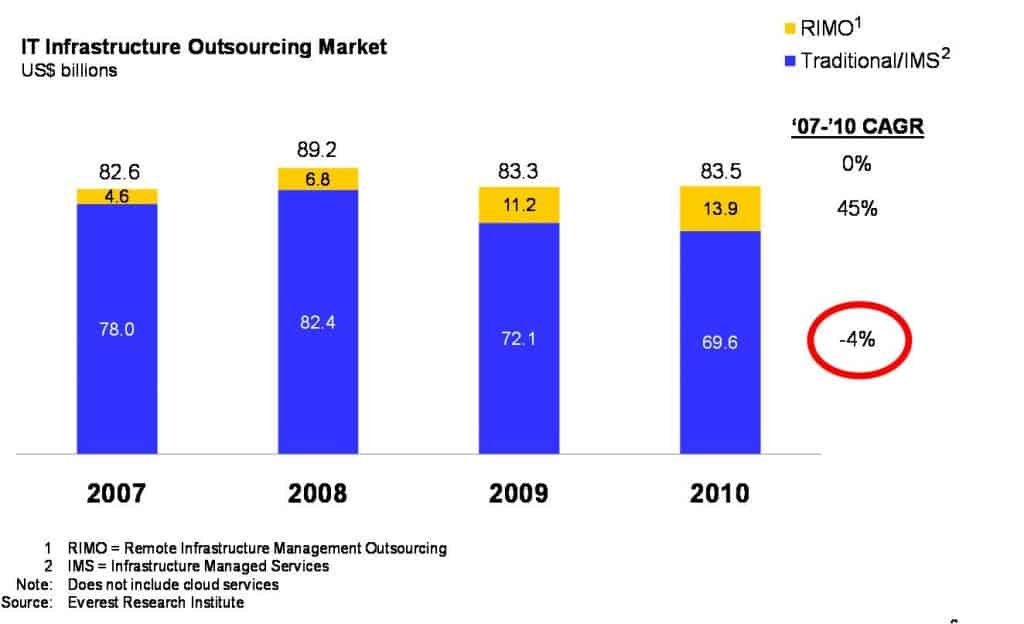
In 1729, Anglo-Irish satirist, essayist, and political pamphleteer Jonathan Swift penned a satirical paper suggesting that to prevent the children of poor people in Ireland from being a burden to their parents or country, and to make them beneficial to the public, the Irish should eat their own children. Driving toward services leadership may require HP to make a similarly tough (yet certainly less ghoulish) choice – is it time to for HP to accelerate the next generation progress of its service business by actively cannibalizing the traditional IT infrastructure outsourcing business?
The IT infrastructure outsourcing market has already moved through a state of slow to zero growth into a phase of contraction.

The primary force disrupting this market has been the growth of the remote infrastructure management outsourcing (RIMO) model, which has effectively replaced traditional IT infrastructure outsourcing (ITO) contracts with a more flexible and cost effective alternative, resulting in services that generate as little as 25 percent of providers’ ITO revenue. (To clarify why providers only capture 25 percent of the revenue… with RIMO offerings, hardware, software, and data center costs are retained by the customer.) This disruptive trend may accelerate rapidly as it combines with the emerging forces of next generation data centers and cloud computing.
Based on HP’s recent bold strategic decisions around its non-performing businesses including PCs, TouchPad platform, and WebOS software, one wonders if it will also take a page from Swift’s proposal in setting direction for its services business. Doing so could enable it to accelerate its positioning as a next generation IT leader by actively eating its legacy customer base by rapidly driving cloud and other next generation IT services into it. This would likely generate significantly higher profit margins but result in lower overall revenue levels. So why should HP contemplate such a painful move? In short, if it doesn’t, someone else will! In fact, reports are that IBM is already snacking within its customer base, significantly expanding its next generation penetration while keeping a close eye on sustaining/growing its profit pool. Additionally, some Indian service providers have specific offerings targeted precisely at replacing legacy infrastructure contracts with more agile RIMO relationships.
As the Irish would have found had they followed Swift’s satirical advice, HP will find this move extremely painful and extremely unpopular in some quarters (e.g., Wall Street). True it will find solace in higher margins of these next generation offerings, which in many instances may be two to three times higher than its current low margins, and enjoy higher growth (albeit from a much smaller base). But this will offer scant relief from the real and emotional pain of absorbing significant stranded costs while replacing each dollar of “traditional” revenue with as little as 25¢ to 50¢ on the dollar of next generation services revenue.
I read the recent announcements about HP’s strategy as increasing the probability that the company will take such bold actions. It seems willing to take strong and decisive actions such as shuttering its WebOS business, TouchPads, and phones, as well as spinning off its underperforming PC business…so why leave its services business out of the mix?




